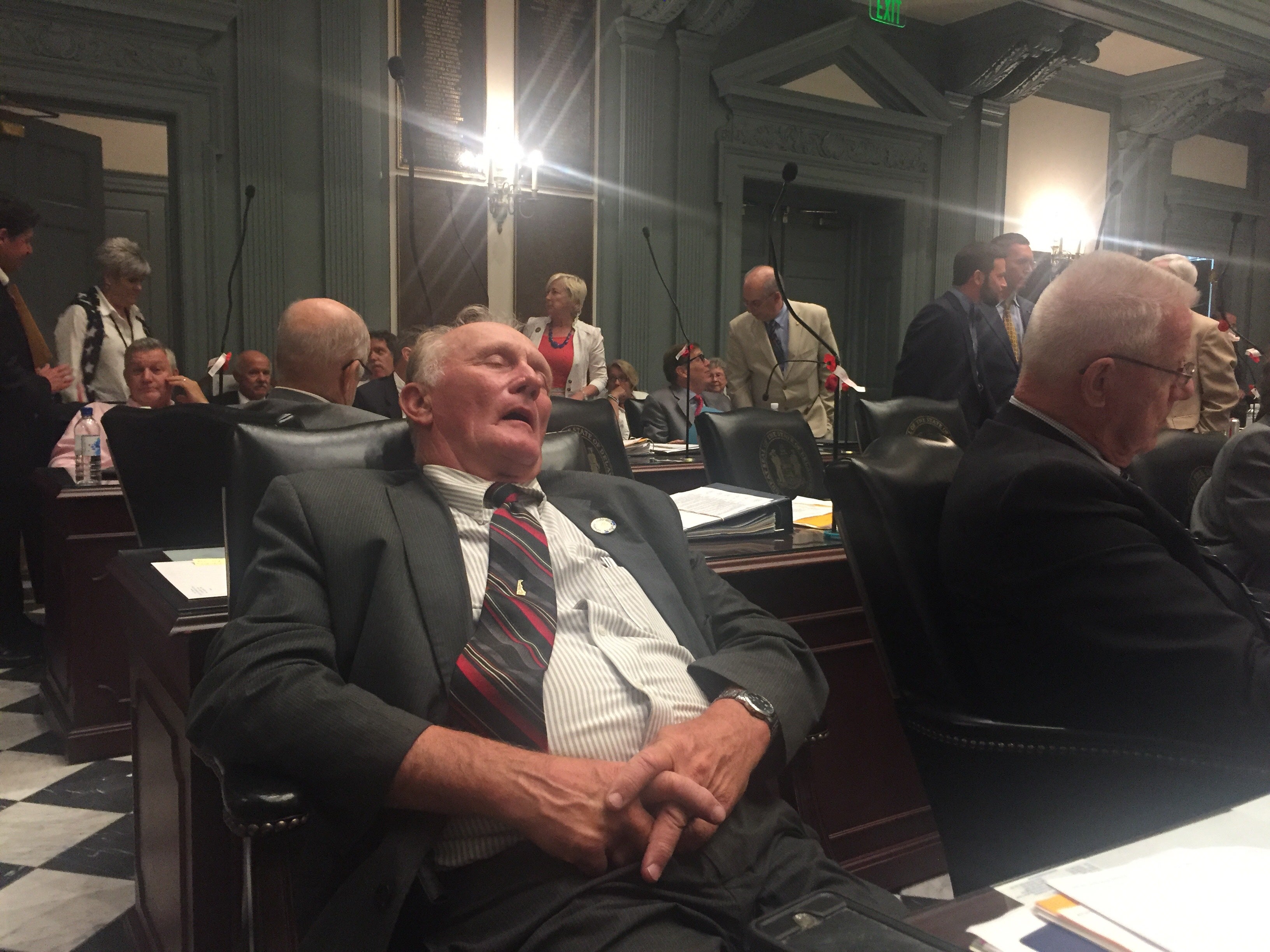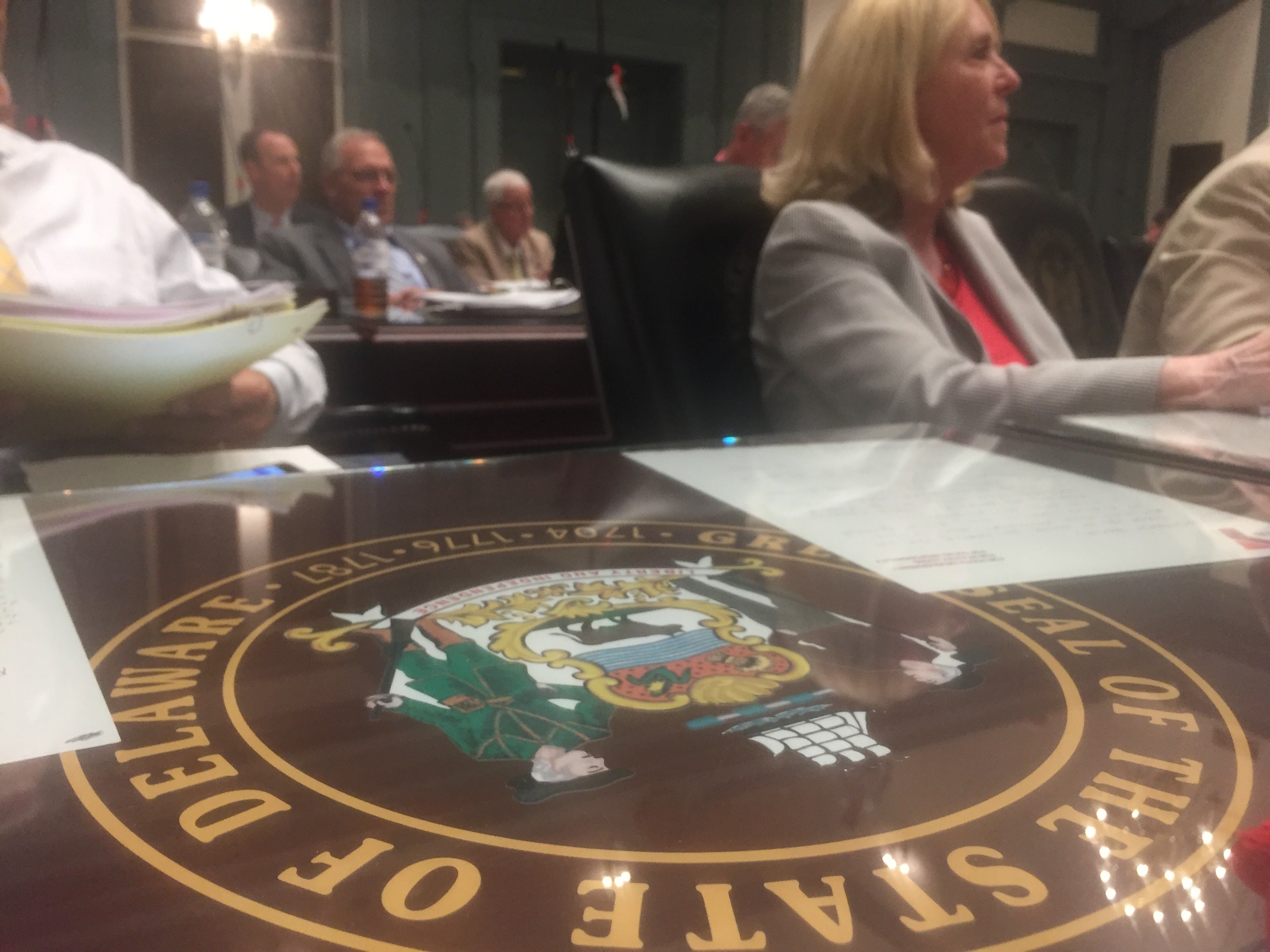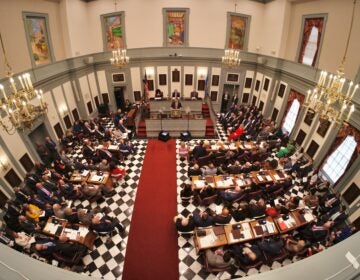Delaware legislative session ends after all-night fight over minimum wage increase
Delaware lawmakers spent the night in Dover in an unanticipated battle over raising the minimum wage.
Delaware lawmakers spent the night in Dover in an unanticipated battle over raising the minimum wage. The all-night fight produced an eventual raise to $9.25 that will be phased in over the next two years.
At 4 a.m. Sunday, the House voted mostly along party lines to approve the wage increase, which was backed by Democrats. The move irritated Republicans, who forced a delay in approving a $816 million bond bill.
After hours of closed-door meetings, a compromise was reached, and a new provision was added: Workers under 18, as well as those over 18 during their first 90 days on the job, can be paid up to 50 cents below the minimum wage.
Republicans were satisfied with the changes, and the bill moved to the Senate just before 8 a.m. Once that vote was recorded, both chambers voted to approve the bond bill for capital projects. During the turmoil, lawmakers also approved the grant-in-aid bill.
Delaware lawmakers traditionally work until well past midnight on June 30, the last day of the fiscal year. In 2017, that session went even longer as legislators could not agree on a budget until the following night. This year, a budget deal was already done, and as the evening session began, there were just a few more items to approve.
Full slate of bills on final day
That $816.3 million bond bill – a 40 percent increase over the current year — is used to pay for highway improvements and other major construction projects such as those at K-12 schools, and the state’s three publicly funded post-secondary institutions: the University of Delaware, Delaware State University, and Delaware Technical and Community College.
Lawmakers also approved a $52.1 million grant-in-aid package for fire companies and nonprofit and community agencies, up from $37.2 million this year.
The Senate also approved a $16.8 million tax decrease for Delaware’s casinos Saturday night and Gov. John Carney signed the bill.
The final day of the two-year legislative session is one that routinely runs well past midnight, especially last year, when the squabbles over spending cuts and proposed tax increases in the face of a nearly $400 million budget shortfall prevented the budget from being signed until July 3 – the latest date in recent history.
Carney and House Speaker Pete Schwartzkopf said early in the evening Saturday they were hoping for a rare early ending, but the speaker held up a big pile of what he said were minor bills on his desk and said he was obligated to bring them to the floor. Neither man could have predicted the fight over the minimum wage that continued past sunrise on Sunday.

In addition, lawmakers spent hours bidding farewell to the 11 members – out of 61 — who had decided not to seek re-election, They include long-serving legislators like Democratic Sen. Margaret Rose Henry, Republican Sen. Gary Simpson, Democratic Rep. Helene Keeley, and Republican Rep. Joe Miro.
“I can’t believe how lucky I am to have done this,’’ Keeley, who has represented the southwest section of Wilmington for 22 years after losing her first three elections. Keeley even brought her golden retriever into the House chamber, telling WHYY, “It’s my last day. I can do what I want.”
The minimum-wage fight
The original proposal called for raising the minimum wage to $10.25 an hour over four years. As the fight dragged on, one sponsor in the Senate, Robert Marshall, removed the higher wage and compromised with a two-year phase-in at $9.25 an hour. That was enough to get the bill passed along party lines.
Supporters, such as Democrat David Sokola, derided the notion that the measure was a “jobs killer,’’ calling it a “work supporter.’’
But opponents said the bill would be too costly to employers, in part because wages would have to rise for too many lower-paid employees. Republican Dave Lawson of Smyrna also said Delaware already can’t fill high-paying construction jobs because the social welfare system is too generous.
“It’s easier to sit home than work,’’ Lawson said.
The Legislature also gave final approval bill that will restrict a tax credit for residents older than 65 to people who learn less than $50,000 a year and couples whose income is less than $100,000. That bill now goes to Carney for his consideration.
Carney signs order to stabilize budget
On Saturday night, Carney also signed an executive order to counter the failure of a proposed constitutional amendment that would create a budget stabilization fund that would amount to 10 percent of the state’s general fund revenue. That’s double the size of the state’s budget reserve account, which is currently kept at five percent.
The bill, which has bipartisan support, was expected to get a vote this week, but one of the sponsors pulled out and it has languished.
So Carney, who has often said the budget still has structural problems that need to be addressed, acted alone.
His order created a smaller budget stabilization fund for budget planning, but Carney acknowledged that lawmakers could override his order and spend the money if they deemed it appropriate.
“Over the past several decades, we’ve seen Delaware’s budget go through good times and bad times,” Carney said. “As every Delaware family knows, you’re supposed to save some of your money during the good times so you can make it through when money gets tight. This executive order holds state government to the same standard. It’ll even things out so when a bad economy comes along, we won’t see massive cuts in services or dramatic tax hikes.
“This is the responsible thing to do for taxpayers who rightly expect us to manage their money wisely.”
Attorney Michael Houghton, Chair of the Delaware Economic and Financial Advisory Council, said he was “disappointed that we were not able to structurally improve the budget process like our committee recommended. It would have made life more predictable for nonprofits, fire companies, and others relying on state funds and avoided the unhealthy ‘feast or famine’ fiscal cycle we are seeing.”
Senate Republicans released a statement applauding Carney for “moving forward the concept of budget reform today.”
“After hearing his remarks today, there is no question that the governor gets it,” the statement read. “He understands that this is an idea whose time has come.”
Republicans said spending grew substantially, despite the governor’s attempts “to rein in the General Assembly.” They have called this approach is unwise and unsustainable. The statement also said, “the commitments made by the governor today will result in a better budgeting process as we move forward.”

But Rep. John Kowalko, a Newark Democrat, reacted with blistering criticism of the governor and the executive order.
“In a dramatic example of a petulant personality that cannot get his way through the legitimate legislative process, Gov. Carney has chosen to emulate a Trumpian tactic that shows a healthy disdain for the democratic principle of separation of powers,” Kowalko said.
Kowalko added that after the bill faltered, Carney decided “to force the same mandated budget cuts onto Delawareans through his preparation of next year’s budget bill,’’ and said the move was a “blatantly disrespectful attempt to abrogate power from the legislature.”
Other accomplishments
Earlier in the legislative session, the General Assembly took up gun control. Bills were passed to ban bump stocks, restricted the ability of people with mental illness to have firearms, and put steeper penalties on people who make straw purchases. Lawmakers let attempts supported by Carney to ban assault-style weapons and high-capacity magazines fizzle without even a vote.
A Democrat-led effort to legalize marijuana, begun in 2017, failed last week in the House by four votes. Five Democrats, including House Speaker Pete Schwartzkopf, abstained. Schwartzkopf told WHYY on Saturday he was against the measure, but that he and others who abstained had a problem with the process because it contained a fiscal note that created 28 jobs to oversee implementation at a cost of $2 million a year.
During this session, Delaware also became the first state to approve a complete ban on marriage for minors. Lawmakers also approved 12 weeks of paid family leave for state employees. Carney, who signed the family leave bill into law Saturday afternoon, said it will help the state keep and attract teachers and other employees.
Teacher Warren Mays, who was with his three children, including a daughter who just turned 2, said paid family leave would have helped his growing family, and he agreed the measure will help the state find and keep employees.
“It’s another added incentive to the benefit package,” Mays said.
The $4.27 billion general fund spending plan Carney signed Thursday represents a 4 percent increase over the current year. Among other provisions, the budget gives $63 million more to education, gives teachers a 2 percent raise and other state employees a $1,000 pay increase, and boosts starting salaries for prison guards to $43,000.
In addition, current state employees will get a $500 bonus and pensioners also will get a $400 bonus.
The two-year session is now adjourned. Another two-year session begins in January.
WHYY is your source for fact-based, in-depth journalism and information. As a nonprofit organization, we rely on financial support from readers like you. Please give today.





